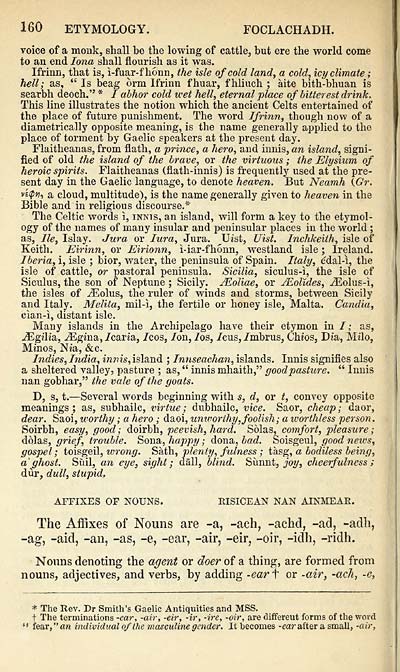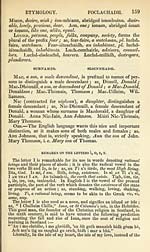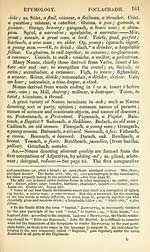Books and other items printed in Gaelic from 1841 to 1870 > Stéidhean a' Ghràmair Ghaëlig
(188) Page 160
Download files
Complete book:
Individual page:
Thumbnail gallery: Grid view | List view

160 ETYMOLOGY. FOCLACHADH.
voice of a monk, shall be the lowing of cattle, but ere the world come
to an end Iona shall flourish as it was.
Ifrinn, that is, ì-fuar-f hònn, the isle ofcold land, a coìd, icyclimate ;
hell; as, " Is beag òrm Ifrinn fhuar, fhliuch ; àite bith-bhuan is
searbh deoch." * / abhor cold wet hell, eternal place of bitterest drink.
This line illustrates the notion which the ancient Celts entertained of
the place of future punishment. The word Jfrinn, though now of a
diametrically opposite meaning, is the name generally applied to the
place of torment by Gaelic speakers at the present day.
Flaitheanas, from flath, a prince, a hero, and innis, an island, signi-
fied of old the island of the brave, or the virtuous ; the Elysium of
heroic spirits. Flaitheanas (flath-innis) is frequently used at the pre-
sent day in the Gaelic language, to denote heaven. But Neamh {Gr.
vz<P'4, a cloud, multitude), is the name generally given to heaven in the
Bible and in religious discourse.*
The Celtic words ì, innis, an island, will form a key to the etymol-
ogy of the names of many insular and peninsular places in the world ;
as, Ile, Islay. Jura or Iura, Jura. Uist, Uist. Inchkeith, isle of
Keith. Eirinn, or Eirionn, ì-iar-fhònn, westland isle ; Ireland.
Iberia, i, isle ; bior, water, the peninsula of Spain. Italy, èdal-ì, the
isle of cattle, or pastoral peninsula. Sicilia, siculus-ì, the isle of
Siculus, the son of Neptune ; Sicily. JEoliae, or JEolìdes, iEolus-ì,
the isles of iEolus, the ruler of winds and storms, between Sicily
and Italy. Melita, mil-ì, the fertile or honey isle, Malta. Candia,
cìan-ì, distant isle.
Many islands in the Archipelago have their etymon in as,
jEgilisi, iEgina, /caria, icos, /on, los, /cus, /mbrus, Chios, Dia, Milo,
Minos, Nia, &c.
Indies, India, inrÀs, island ; Innseachan, islands. Innis signifies also
a sheltered valley, pasture ; as, " innis mhaith," goodpasture. " Innis
nan gobhar," the vale of the goats.
D, s, t. — Several words beginning with s, d, or t, convey opposite
meanings ; as, subhailc, virtue ; dubhailc, vice. Saor, cheap ; daor,
dear. Saoi, worthy ; a hero ; daoi, umiiorthy,foolish; a worthless person.
Soirbh, easy, good ; doirbh, peevish, hard. Sòlas, comfort, pleasure ;
dolas, grief trouble. Sona, happy ; dona, bad. Soisgeul, good news,
gospel ; toisgeil, wrong. Sàth, plenty, fulness ; tàsg, a bodiless being,
a ghost. Sùil, an eye, sight ; dall, blind. Sùnnt, joy, cheerfulness ;
dùr, dull, stupid,
AFFIXES OF NOUNS. RISICEAN NAN AINMEAR.
The Affixes of Nouns are -a, -ach, -achd, -ad, -adh,
-ag, -aid, -an, -as, -e, -ear, -air, -eir, -oir, -idh, -ridh.
Nouns denoting the agent or doer of a thing, are formed from
nouns, adjectives, and verbs, by adding -ear f or -air, -ach, -e,
* The Rev. Dr Smith's Gaelic Antiquities and MSS.
t The terminations -ear, -air, -eir, -ir, -ire, -oir, are differeut forms of the word
i6 fear," an individual ofthe mascidine gcnder. It becomes -earafter a small, -air,
voice of a monk, shall be the lowing of cattle, but ere the world come
to an end Iona shall flourish as it was.
Ifrinn, that is, ì-fuar-f hònn, the isle ofcold land, a coìd, icyclimate ;
hell; as, " Is beag òrm Ifrinn fhuar, fhliuch ; àite bith-bhuan is
searbh deoch." * / abhor cold wet hell, eternal place of bitterest drink.
This line illustrates the notion which the ancient Celts entertained of
the place of future punishment. The word Jfrinn, though now of a
diametrically opposite meaning, is the name generally applied to the
place of torment by Gaelic speakers at the present day.
Flaitheanas, from flath, a prince, a hero, and innis, an island, signi-
fied of old the island of the brave, or the virtuous ; the Elysium of
heroic spirits. Flaitheanas (flath-innis) is frequently used at the pre-
sent day in the Gaelic language, to denote heaven. But Neamh {Gr.
vz<P'4, a cloud, multitude), is the name generally given to heaven in the
Bible and in religious discourse.*
The Celtic words ì, innis, an island, will form a key to the etymol-
ogy of the names of many insular and peninsular places in the world ;
as, Ile, Islay. Jura or Iura, Jura. Uist, Uist. Inchkeith, isle of
Keith. Eirinn, or Eirionn, ì-iar-fhònn, westland isle ; Ireland.
Iberia, i, isle ; bior, water, the peninsula of Spain. Italy, èdal-ì, the
isle of cattle, or pastoral peninsula. Sicilia, siculus-ì, the isle of
Siculus, the son of Neptune ; Sicily. JEoliae, or JEolìdes, iEolus-ì,
the isles of iEolus, the ruler of winds and storms, between Sicily
and Italy. Melita, mil-ì, the fertile or honey isle, Malta. Candia,
cìan-ì, distant isle.
Many islands in the Archipelago have their etymon in as,
jEgilisi, iEgina, /caria, icos, /on, los, /cus, /mbrus, Chios, Dia, Milo,
Minos, Nia, &c.
Indies, India, inrÀs, island ; Innseachan, islands. Innis signifies also
a sheltered valley, pasture ; as, " innis mhaith," goodpasture. " Innis
nan gobhar," the vale of the goats.
D, s, t. — Several words beginning with s, d, or t, convey opposite
meanings ; as, subhailc, virtue ; dubhailc, vice. Saor, cheap ; daor,
dear. Saoi, worthy ; a hero ; daoi, umiiorthy,foolish; a worthless person.
Soirbh, easy, good ; doirbh, peevish, hard. Sòlas, comfort, pleasure ;
dolas, grief trouble. Sona, happy ; dona, bad. Soisgeul, good news,
gospel ; toisgeil, wrong. Sàth, plenty, fulness ; tàsg, a bodiless being,
a ghost. Sùil, an eye, sight ; dall, blind. Sùnnt, joy, cheerfulness ;
dùr, dull, stupid,
AFFIXES OF NOUNS. RISICEAN NAN AINMEAR.
The Affixes of Nouns are -a, -ach, -achd, -ad, -adh,
-ag, -aid, -an, -as, -e, -ear, -air, -eir, -oir, -idh, -ridh.
Nouns denoting the agent or doer of a thing, are formed from
nouns, adjectives, and verbs, by adding -ear f or -air, -ach, -e,
* The Rev. Dr Smith's Gaelic Antiquities and MSS.
t The terminations -ear, -air, -eir, -ir, -ire, -oir, are differeut forms of the word
i6 fear," an individual ofthe mascidine gcnder. It becomes -earafter a small, -air,
Set display mode to:
![]() Universal Viewer |
Universal Viewer | ![]() Mirador |
Large image | Transcription
Mirador |
Large image | Transcription
Images and transcriptions on this page, including medium image downloads, may be used under the Creative Commons Attribution 4.0 International Licence unless otherwise stated. ![]()
| Rare items in Gaelic > Books and other items printed in Gaelic from 1841 to 1870 > Stéidhean a' Ghràmair Ghaëlig > (188) Page 160 |
|---|
| Permanent URL | https://digital.nls.uk/101713855 |
|---|
| Description | Out-of-copyright books printed in Gaelic between 1631 and 1900. Also some pamphlets and chapbooks. Includes poetry and songs, religious books such as catechisms and hymns, and different editions of the Bible and the Psalms. Also includes the second book ever published in Gaelic in 1631. |
|---|

